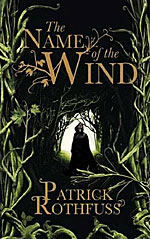
![]() jynnantonnyx
jynnantonnyx
2/8/2010
![]()
Patrick Rothfuss may be getting best known for the amount of time he takes editing his novels—he spent seven years editing The Name of the Wind, and it has been three years since its publication, with still no solid date set for the sequel—but judging by his first novel, it is time well spent. His is one of those rare fantasy genre novels that focuses strongly on the human element and only a little on the fantasy. For instance, Rothfuss, following in the great tradition begun by Tolkien, provides a map of his fictional continent, complete with cities, kingdoms and oceans; it is to his credit that I never once had to reference it. Magical powers and strange beasts also have their place, but it is subordinate to the memoirs of one Kvothe, the greatest hero still alive.
Kvothe is the storyteller, and he is telling the story of himself. From his young childhood as the son of traveling performers, to his Dickensian days in a monstrous city, to his unlikely admission into The University as a mid-teenager, he is certainly not the kind of man who doubts his own strength. If he were not so well-accomplished, he would be justly called a braggart. Indeed, one of the most fantastic parts of this fantasy novel is how easily he learns and grows. An arcanist falls in with the troupe, and the young narrator quickly learns all of the man’s basic lessons and even some that he had never considered as possibilities. Kvothe is a prodigy similar to Ender in Ender’s Game or Will in Good Will Hunting, and his quick rise is one of the few disappointments of the story. As a teacher himself, one would expect Rothfuss to be more sympathetic to the hard grunt work required to learn anything worthwhile, but Kvothe just makes it look a little too easy.
While some parts of the story are of higher quality than others, none of it is bad, and none of it is even particularly boring. The quick movement of the first half of the book grinds down when Kvothe joins The University, but that is only because Rothfuss is carefully building up a world of characters and relationships, not to mention the various sciences being taught and learnt. We learn almost nothing of this world’s vast history or its varied geography, but by the end of the first novel it feels like we know the world intimately. That is not a mean feat.
Rumor has it that 2010 will finally see the publication of book two, The Wise Man’s Fear, and hopefully that is the case. Reading this novel will leave you wanting more, and it will be all you can do to keep from writing nagging comments on Rothfuss’ blog.
http://blog.worldswithoutend.com/2010/02/the-name-of-the-wind/